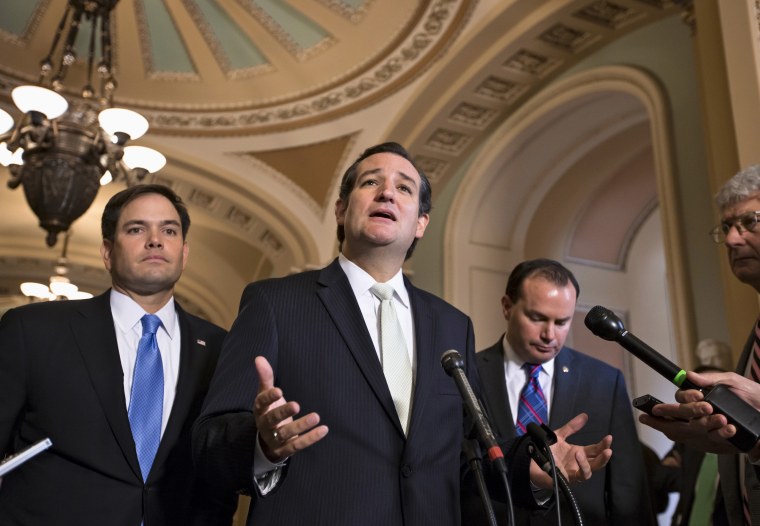We've grown accustomed to some clear divisions among Republicans on foreign policy, with the Dick Cheney wing of the GOP aggressively at odds with the Rand Paul wing. It's not exactly a 50-50 split -- the former contingent is vastly larger than the latter -- but it's the basis for some spirited intra-party debates.
These fights are largely about military intervention abroad and the utility of using force. They're not, however, the sole basis for Republican disagreements.
For example, one of the lead stories on Politico this morning said Republicans are "livid" over President Obama's new U.S. policy towards Cuba, and there's obviously a great deal of truth to this.
Leading Republicans reacted with outrage Wednesday over the Obama administration's move to normalize relations with Cuba, with some casting it as appeasement and the product of blackmail by the communist Castro government.
GOP critics of the White House's announcement weren't hard to find yesterday. Every Republican who's likely to run for president in 2016 was eager to tell news organizations how outraged they are, as were many GOP congressional leaders. As the day progressed, Sens. Marco Rubio (R-Fla.) and Ted Cruz (R-Texas) seemed to be having a competition of sorts, with each effectively saying, "No, I'm more enraged than you."
It's hard to know how much of this was sincere and how much of it was knee-jerk opposition to everything the president says, but either way the Republican posturing puts the party at odds with the American mainstream. David Graham noted yesterday, "[I]n every Gallup poll since 1999, a majority of Americans have wanted to normalize relations with Cuba, with the number varying between 55 and 71 percent in favor. And bare majorities -- or in one 2000 poll, a plurality -- have also supported ending the U.S. embargo against the country."
More important, however, is the degree to which the Republican posturing also masked GOP support for Obama's policy shift.
Sen. Jeff Flake (R-Ariz.), for example, was on the plane back from Cuba with Alan Gross yesterday, and the Arizonan said he'll sponsor legislation to vastly expand American travel to Cuba. Soon after, Rep. Mark Sanford (R-S.C.) said he'll introduce an identical bill in the House.
Around the same time, Rep. Jason Chaffetz (R-Utah), the incoming chairman of the House Oversight Committee, publicly expressed support for the Obama administration's policy.
Sen. Bob Corker (R-Tenn.), the incoming chairman of the Senate Foreign Relations Committee, held his fire altogether, saying only that his panel would be "closely examining" the policy change.
Meanwhile, the GOP's allies at the U.S. Chamber of Commerce are delighted by the White House's new policy towards Cuba, leaving Marco Rubio in the awkward position of blasting American "business interests" looking for profits.
Since when do far-right Republicans criticize the U.S. private sector looking for expanded trade?
The politics of this breakthrough are more nuanced than some might think. Indeed, the White House could plausibly claim ample "bipartisan support" for their policy.
Update: This afternoon, Sen. Rand Paul (R-Ky.) also expressed support for Obama's shift on Cuba. “The 50-year embargo just hasn’t worked,” Paul said, adding, "In the end, I think opening up Cuba is probably a good idea." So far, he's the only Republican likely to run for president to endorse the change.
